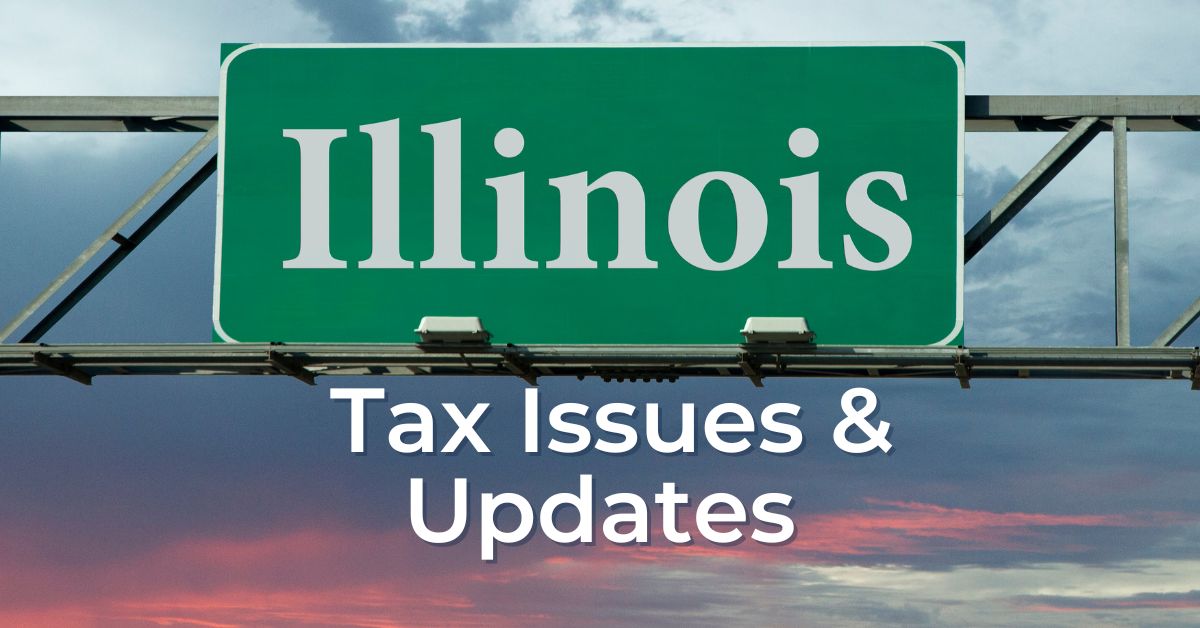
The University of Illinois Tax School held a webinar on January 28 on Illinois Tax Issues & Updates. The instructor put together answers to questions submitted during the webinar as a reference for tax professionals who prepare Illinois returns. Be sure to carefully review all of the answers. The below is not intended to substitute your own judgment or your firm’s best practices.
On a side note, we realize many Tax School followers practice in other states and this article may not have as much relevance for you. Don’t worry, our regularly scheduled federal tax content will resume next post.
IL Gives Tax Credit
Q: Are federal charitable donations for Schedule A reduced by the amount of the IL Gives credit received?
If the charitable organization meets the federal requirements for a qualifying organization, a taxpayer is not precluded from deducting the contribution on the federal Schedule A and the IL-1040 under the Illinois Gives Credit. You can search for a tax-exempt organization under https://apps.irs.gov/app/eos/.
Q: Is there a listing of QCFs somewhere?
There is a listing of Qualified Community Foundations (QCFs) in MyTax Illinois. When logged into a MyTax Illinois account, go to Income Tax>View more account options. After clicking on “Contribute to Illinois Gives” you can view the available QCFs on the application screen.
Q: Is there a paper route for the IL Gives Tax Credit?
You must request approval to make a contribution through an active MyTax Illinois account. There is no paper option.
Q: Is the IL Gives Tax Credit refundable or can the credit be carried forward to future years?
The Illinois Gives Tax Credit is not a refundable credit. If IL income tax liability is less than the full credit amount, the Illinois Gives tax credit may be carried forward. The carryforward period is five years. The credit cannot be carried back.
IL Paid Leave for All Workers Act
Q: What happens to paid leave if not used by the employee?
If paid leave is not used by an employee, the employee can carry over unused, accrued time from one year to the next. An employer is not required to allow employees to use more than 40 hours of paid leave in a year. If all paid leave hours are provided at the beginning of the year (frontloaded), any unused paid leave is not permitted to be carried over into the next 12-month period.
Q: Is there a minimum number of employees in a company to be required to provide paid leave time?
The Paid Leave Act applies to employers of all sizes; there is no minimum number of employees required.
IL Investment Partnerships
Q: Investment Partnership test is either assets or income or both?
There are two requirements for a partnership to meet the definition of an IL investment partnership: the asset Test and the gross Income Test:
Asset Test – No less than 90% of the partnership’s cost of its total assets consists of qualifying investment securities, deposits at banks or other financial institutions, and office space and equipment reasonably necessary to carry on its activities as an investment partnership.
Gross Income Test – No less than 90% of its gross income consists of interest, dividends, gains from the sale or exchange of qualifying investment securities, and the distributive share of partnership income from lower-tier partnership interests meeting the definition of qualifying investment security as defined under the United States code.
The entity must also be treated as a partnership for federal income tax purposes.
Q: Is rental income acceptable income for determination of investment income in an investment partnership?
Rental income does not fall under the definition of the gross income test or under the definition of a qualifying investment security.
Sales and Use Tax on Leased or Rented Tangible Personal Property
Q: Any guidance on what qualifies for the new sales tax for tangible personal property rentals?
A lessor of tangible personal property will be subject to Illinois Sales and Use tax laws if, in the ordinary course of business, they lease or offer to lease merchandise.
Q: Are businesses that rent items like tables and chairs subject to TPP and required to pay this tax? Can a business rent a hall and avoid sales tax by saying the chairs and tables are free with rental? What about property such as apartments or leased homes?
This would apply to a business that rents tables and chairs as part of their ordinary course of business. Property, such as apartments or homes, does not fall under the definition of tangible property.
Renting space or a hall also does not meet the definition of tangible property. Tables, chairs, or other tangible property in the leased space, that is not rented out separately, would not be subject to sales tax. Lease of the hall is the ordinary course of business.
By Rheanon Rabideau, CPA




